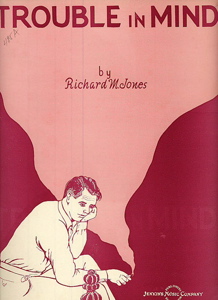| Trouble in Mind | |
|---|---|
 | |
| Studio album by Big Bill Broonzy | |
| Released | February 22, 2000 |
| Recorded | 1956 - 1957 |
| Genre | Country blues |
| Length | 1:13:39 |
| Label | Smithsonian Folkways |
Trouble in Mind is an album by American blues musician Big Bill Broonzy. It was released on February 22, 2000 by Smithsonian Folkways. The album consists of traditional folk, blues, and spiritual songs featuring Broonzy accompanying himself on acoustic guitar and a guest appearance by Pete Seeger. Suffering from cancer, Broonzy realized his time was limited and hence recorded extensively between 1956 and 1957. While most of the work draws from the album Big Bill Broonzy Sings Country Blues (1957), arranged by Moses Asch and Charles Edward Smith, Trouble in Mind is also sourced from concert broadcasts and interviews recorded late in Broonzy's career.

An album is a collection of audio recordings issued as a collection on compact disc (CD), vinyl, audio tape, or another medium. Albums of recorded music were developed in the early 20th century as individual 78-rpm records collected in a bound book resembling a photograph album; this format evolved after 1948 into single vinyl LP records played at 33 1⁄3 rpm. Vinyl LPs are still issued, though album sales in the 21st-century have mostly focused on CD and MP3 formats. The audio cassette was a format used alongside vinyl from the 1970s into the first decade of the 2000s.
Blues is a music genre and musical form which was originated in the Deep South of the United States around the 1870s by African Americans from roots in African musical traditions, African-American work songs, spirituals, and the folk music of white Americans of European heritage. Blues incorporated spirituals, work songs, field hollers, shouts, chants, and rhymed simple narrative ballads. The blues form, ubiquitous in jazz, rhythm and blues and rock and roll, is characterized by the call-and-response pattern, the blues scale and specific chord progressions, of which the twelve-bar blues is the most common. Blue notes, usually thirds or fifths flattened in pitch, are also an essential part of the sound. Blues shuffles or walking bass reinforce the trance-like rhythm and form a repetitive effect known as the groove.

Big Bill Broonzy was an American blues singer, songwriter and guitarist. His career began in the 1920s, when he played country blues to mostly African-American audiences. Through the 1930s and 1940s he successfully navigated a transition in style to a more urban blues sound popular with working-class African-American audiences. In the 1950s a return to his traditional folk-blues roots made him one of the leading figures of the emerging American folk music revival and an international star. His long and varied career marks him as one of the key figures in the development of blues music in the 20th century.
Contents
Like other albums issued by Smithsonian Folkways, Trouble in Mind has been kept in print; the production quality of the album is higher than most installments of the label's catalogue. An accompanying booklet, arranged by Jeff Place and Anthony Seeger, includes photos and notes documenting Broonzy's stint with Folkways. While Trouble in Mind only represents the latter portion of Broonzy's career, music critics have recognized the album for its historically significant material.
















